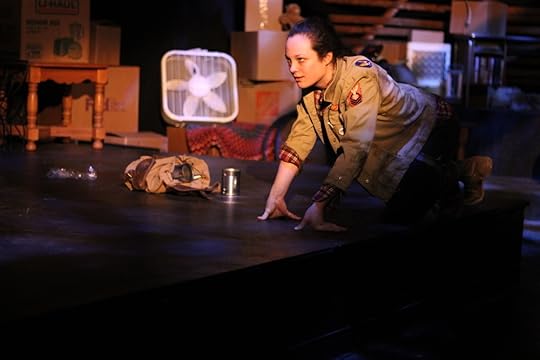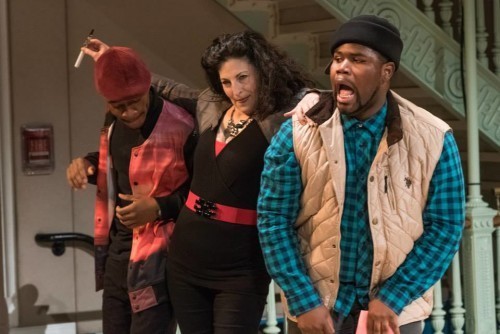Notes on four shows
After a slow holiday season things are picking up again. Four local productions have connections with science theater (or with me).
Tonight only, Poets’ Theatre will be presenting “The Word Exchange,” staged poetry in translation: “Understand the profound potency and music of language in this extraordinary evening of international poetry, including works from Vietnam, Italy, France, Ancient Greece and Rome, evocatively performed both in the original and in translations by world class poets and actors,” from the website.
I can’t go because tonight is rehearsal for the Cambridge Symphony Orchestra’s Family Concert, which I’m narrating. I wish I could, because the question of what it means to act in a language that is not your native one is of great interest. In a second language, emotion words don’t feel as strong, curse words don’t give you that little jolt of release. Swearing or using taboo words (e.g., racial slurs) in your native language registers on the body in ways that the same words in a foreign language don’t.
My good friend Catherine Caldwell-Harris does research on this–sparked when a Turkish graduate student made an off-color joke one day, then blushed and giggled and said, “I can make sex joke in English, I cannot make sex joke in Turkish”–and wrote about the topic in Scientific American:
In the last decade, however, research has shown that answers to questions can depend on the language of the question. For example, when Chinese-English bilinguals were randomly assigned to answer a self-esteem questionnaire in Chinese, they received scores indicating lower self-esteem than those who answered the same questionnaire in English. In this case, cultural differences appear to be the cause. When reading self-esteem questions in English, bicultural respondents are cued to adopt the American self-enhancing bias. When reading questions in Chinese, respondents may draw on the traditional Chinese virtue of modesty.
What, then, is it like to act in a foreign language? I’d love to hear from anyone who’s had experience with it.
“The Word Exchange” plays tonight only, at 7:30 at Suffolk University’s Modern Theatre. You can get tickets here.
***
Last night, Mr. Improbable and I saw “Chalk,” produced by Fresh Ink Theatre at the Boston Playwrights’ Theatre. “It’s the kind of thing we’d like to see more of!”–this science-theater power media couple declared. It is, too. A science-fiction play with no special effects, set after an alien invasion has wiped out most human life on earth except for one determined, resourceful teacher and the woman who may be her daughter–or may be something very different. It reminded us both of the old “Twilight Zone” or “Outer Limits” screenplays, using a speculative element to tell a very basic human story. (For a dude playwright, Walt McGough fully groks the mother-daughter thing, and I mean fully.)

Caroline Rose Markham as Cora. Photo by Louise Hamill.
“Chalk” is playing through January 24, and tickets are online here.
***
My talkback at the Huntington’s “Vanya and Sonia and Masha and Spike” went beautifully last week, and I may join some of the cast members on Boston Public Radio next week to discuss the role of family dynamics and manners in the script. The epic confrontation during the show occurs when Spike rudely texts a friend during a reading of Vanya’s play … can’t imagine why they thought to bring Miss Conduct on to analyze the crime scene!
“V&S&M&S,” by Christopher Durang, mashes his own autobiography up with a parody of classic Chekhov plays, mostly “The Seagull” and “Uncle Vanya.” In “The Seagull,” a character has a play performed–the play-within-a-play is meant to be overly intellectual and self-consciously cutting edge. For Chekhov, that’s heavy Symbolist drama–for Durang in the 21st century, it’s a science play starring a molecule contemplating the heat death of the universe.
Science theater, you have been parodied by Christopher Durang: You have arrived.
“Vanya and Sonia and Masha and Spike” runs through February 1 and tickets are available here.
***
There isn’t any science content in “Measure for Measure,” even if it sounds like it could take place in a lab. The current Actors’ Shakespeare Project production, directed by Megan Sandberg-Zakarian, is one of the best shows they’ve done. Yesterday I interviewed ASP company member Michael Forden Walker about his role as Duke Vincentio, the Rob Ford of (fictional) Rennaissance Vienna. It’s a fantastic show.
Speaking of second languages, it’s worth the price of admission just to hear Sarah Newhouse do Shakespeare in a heavy Masshole accent.

Gentleman Client (Jared Michael Brown), Mistress Overdone (Sarah Newhouse), Lucio (Johnnie McQuarley).
Photo courtesy Stratton McCrady Photography
“Measure for Measure” runs through February 1 and tickets are available here.
Robin Abrahams's Blog



